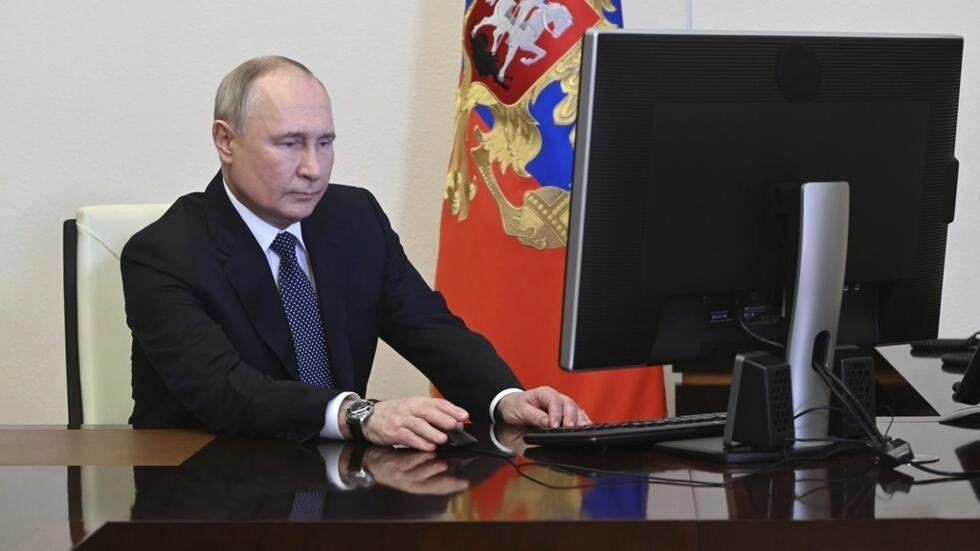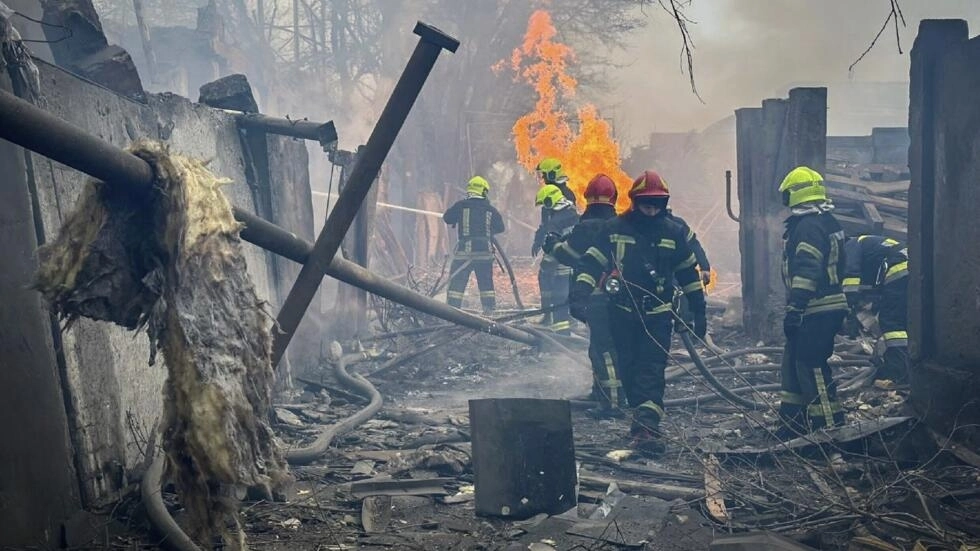Russian regions bordering Ukraine were hit by new attacks on Saturday (16), in the midst of the presidential elections. At least two people were killed and Vladimir Putin, committed to his re-election, promised to retaliate.
(RFI) In Belgorod, a city very close to Ukraine and often the target of attacks, “two people were killed, a man and a woman,” said the governor of the region, Vyacheslav Gladkov, adding that eight rockets were shot down.
According to Gladkov, the man died when his truck was hit and the woman was killed in a parking lot. The woman’s son was seriously injured and hospitalized, two other people were wounded.
Ukraine has been promising for months to take the conflict across the border, in retaliation for the offensive and bombardment it has been suffering for more than two years.
In recent weeks, air strikes have intensified and fighters claiming to be Russians opposed to Vladimir Putin say they are making armed incursions. The Russian army said on Saturday that it had repelled attempts by Ukrainian groups to infiltrate the Belgorod region. The authorities in the occupied Kherson region in southern Ukraine also said that a Ukrainian drone strike had killed one person and injured four others.
Russia in presidential elections
These attacks come at a time when the Kremlin, with the presidential election that began on Friday and will end on Sunday, wants to project the image of a Russia united around its leader.
Hundreds of kilometers from Belgorod, the Russians who voted on Saturday in Serguiev Possad, in the Moscow region, had these military actions very much in mind.
Inessa Rojkova, 87, hopes above all for the “end of the special operation”, a euphemism used to describe the offensive in Ukraine. “Can you imagine how many people have died and now our regions near the front are suffering?” she asks. Elena Kirssanova, 68, believes that the attacks are intended to “scare” Russia. “But this is not a nation that allows itself to be intimidated,” proclaims this woman whose vote will go to Vladimir Putin.
There is no doubt about the outcome of the election, as the opposition has been eradicated. But the electoral process was marred by a series of incidents of damage to polling stations.
On Friday, around 15 people were arrested in various regions for spilling paint on ballot boxes, throwing a Molotov cocktail at a polling station and setting fire to a polling booth.
On Saturday, a woman was arrested for spilling a green liquid on a ballot box in Kaliningrad, the authorities in this Russian territory without an exit route to the European Union said. Another person was arrested while “trying to introduce” green ink into a polling station in Yekaterinburg, in the Urals, according to the Tass news agency.
The substance poured into the ballot boxes resembles “zelionka”, a surgical antiseptic that has been used in attacks on Russian opponents, including Alexei Navalny, in recent years. The exact motives for these acts are not known. The head of the electoral commission, Ella Pamfilova, claimed that the criminals were acting for money promised by “bastards from abroad”.
In any case, these incidents have led to a tightening of security measures at polling stations in Crimea, the authorities of this annexed peninsula told the Ria Novosti news agency. Voting is also taking place in the occupied Ukrainian territories, which has been denounced by Kiev.
Pressure from employers
“We’re all used to the idea that everything has already been decided for us, there’s nothing we can do,” commented Nadejda, 23, at a polling station in Moscow. She said she had gone to vote because otherwise she would have “problems” with her employer.
In all elections in Russia, government departments and state companies are accused by specialized NGOs, the opposition and the media of orchestrating the votes of their employees, under penalty of sanctions.
According to the independent Russian media outlet The Bell, classified as a “foreign agent”, the Russian airline Aeroflot forced its employees to go to the polls.
Saturday of mourning in Ukraine and Russia’s “terrorist tactics”
Ukraine is in mourning following a deadly attack in Odessa on Friday (15). Twenty people were killed, according to emergency services, and 73 others were injured, according to Ukraine’s prosecutor general. Volodymyr Zelensky spoke of an attack with two missiles, the second of which hit “just as rescuers and medics were arriving at the scene of the attack”.
The Ukrainian president described the attack as “absolutely despicable”. The town hall of Odessa, a large port city in the south of the country, declared a day of mourning on Saturday. According to the Ukrainian army, Russian forces fired “Iskander ballistic missiles from Crimea”. When the rescue teams arrived and began to “put out the fire, remove the rubble and look for victims”, according to the same source, “the enemy launched another missile attack”.
These methods were denounced by Odessa MP Oleksiy Hontcharenko, who was contacted in Odessa, his hometown. “In his opinion, Russia used terrorist tactics in this attack. Ten minutes after the first attack, Russia strikes again, in the same place, to attack the doctors, the people who are there to help the wounded. It’s like all terrorists. And because of that, more than 20 people died and dozens were injured.”
The city is very sad right now and people are shocked by it. In the last month, this wasn’t the first or second attack, it’s almost every day a new attack on our city.
“Odessa is the most strategic city in Ukraine for Russia,” concluded the MP. And because of this strategic value, I think Russia is now escalating with this attack.”
International reactions point to ‘illegitimacy’ in Putin’s re-election with 87% of the vote in Russia

Former Russian President Dmitri Medvedev hailed Vladimir Putin’s “resounding victory” in the Russian presidential elections, while state television highlighted “the colossal support” obtained by the Kremlin mastermind. And, according to the Russian electoral commission, he won 87.97% of the vote after 24% of polling stations had been counted. This is a record for a man who has always obtained between 64% and 68% of the vote in previous elections.
“I congratulate Vladimir Putin on his resounding victory,” wrote Medvedev, number 2 in the Russian security council and who held the presidency from 2008 to 2012, with Vladimir Putin as prime minister.
The government insisted in advance that the Russian people should be “united” around their leader, portraying the Ukrainian conflict as a Western plot to destroy Russia.
The attack on Ukraine, launched by Putin in February 2022 and with no end in sight despite tens of thousands of deaths, was the backdrop to the vote, especially as attacks on Russian territory have multiplied this week.
Ukrainian President Volodymyr Zelensky described Putin as a man “drunk on power” who wants to “rule forever”.
“Today, the Russian dictator is once again faking an election. It’s obvious to everyone in the world that this character, as has happened many times throughout history, is drunk with power and is doing everything he can to rule forever,” said Zelensky.
He continued: “There is no legitimacy in these fake elections and there can be none. This person should be tried in The Hague (seat of the International Criminal Court). That is what we must guarantee,” he charged.
US and other international reactions
“These elections are clearly neither free nor fair, given the way Putin has imprisoned his political opponents and prevented others from running against him,” the White House said in a statement.
Poland, for its part, considered that the presidential election “was not legal, free and fair”. In Russia, the authorities left no room for opponents of the government: the three other candidates selected were all aligned with the Kremlin, whether in relation to Ukraine or the repression that culminated in the death of Alexei Navalny in an Arctic prison in February.
Against this backdrop, the wife of Vladimir Putin’s late number one critic, Yulia Navalnaya, called on her supporters to turn out in force and vote against the Russian president at the same time, at midday on Sunday. She voted after several hours of waiting amid a huge crowd at the Russian embassy in Berlin. “I wrote (on the ballot paper) the name ‘Navalny’ because it is not possible (…) that a month before the elections, Putin’s main opponent, who is already in prison, will be killed,” she told the press after casting her vote.
Navalny’s team reacted shortly after the result was released by state media, saying that Putin’s vote tally in the Russian presidential election “has no connection with reality”.
The German Foreign Ministry wrote on the X network that “the pseudo-election in Russia is neither free nor fair, the result will surprise no one. Putin’s regime is authoritarian, based on censorship, repression and violence. The ‘election’ in the occupied territories of ‘Ukraine’ is null and void and yet another violation of international law.”
On the same network, David Cameron, Secretary of State for Foreign and Commonwealth Affairs declared that “London regrets the lack of ‘free and fair’ elections in Russia” and accused the Kremlin of illegally holding the election on Ukrainian territory, while earlier the ministry’s official website said that “the UK will continue to provide humanitarian, economic and military aid to Ukrainians defending their democracy”.
Strikes and incursions
Russia’s diplomatic spokeswoman said that the voters who flocked to the embassies in Paris, London and Berlin were not opposition supporters.
“They came to vote, taking advantage of the opportunity that their country, Russia, offered them, despite all the threats from the West,” Maria Zakharova wrote on Telegram.
The hostilities in Ukraine were also included in the vote. The election week was marked by deadly airstrikes and attempted ground incursions by Ukraine into Russian territory, responses to Russia’s daily bombardments and attacks on its neighbor for more than two years.
On Sunday morning, a 16-year-old girl was killed in an air strike in the town of Belgorod, close to the border and often the target of attacks. In the afternoon, another person died and 19 were injured in the same region.
And a military unit operating from Ukraine, the “Siberian Battalion”, claimed on Sunday morning to have entered the Russian village of Gorkovsky.
Despite these attacks, a prolonged deadly conflict and increasingly restricted freedoms, the Kremlin master seems to enjoy very real popularity.
(With information from AFP) *** Translated by DEFCONPress FYI Team ***
